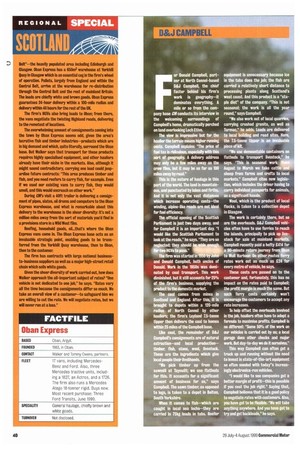F or Donald Campbell, partner at North Connel-based D&J Campbell, the
Page 42

If you've noticed an error in this article please click here to report it so we can fix it.
chief factor behind his firm's work is geography—it dominates everything. A mile or so from the company base 01 conducts its interview in the welcoming surroundings of Campbell's home, dramatically perched on land overlooking Loch Etive.
The view is impressive but for the hauler the terrain means higher running costs. Campbell explains: "The price of fuel tax is ridiculous, espedaly wfth this sort of geography. A delivery address may only be a few miles away as the crow flies, but it may be as far as 100 miles away by road."
This is the nature of haulage in this part of the world. The land is mountainous, and punctuated by lakes and firths. And it is not only the vast distances which increase operating costs—the winding, alpine-like roads are not ideal for fuel efficiency.
The official opening of the Scottish Parliament is just two days away, and for Campbell it is an important day. "I would like the Scottish Parliament to look at the roads," he says. "They are so neglected; they should Or two HG Veto pass."
The firm was started in and Donald Campbell, both uncles of Donald. Work in the 1950s was dominated by coal transport. This work diminished, but it still accounts for 25% of the firm's business, supplying the product to the domestic market.
The coal comes from mines in Scotland and England. After this, it is brought to depots within a 120-mile radius of North Cannel by other hauliers; the firm's Leyland 7.5-tonne tipper then delivers the coal to homes within 25 miles of the Campbell base.
Like coal, the remainder of D&J Campbell's consignments are of natural extraction—and local production— timber, fish, stone, wool, livestock These are the ingredients which give local people their livelihoods.
"We pick timber up from the sawmill at Taynuilt; we use flatbeds for this. It accounts for a significant amount of business for us," says Campbell. The sawn timber, as opposed to logs, is taken to a depot in Bolton, South Yorkshire.
When it comes to fish—which are caught in local sea lochs—they are carried in 75kg loads in tubs. Reefer equipment is unnecessary because ice in the tubs does the job; the fish are carried a relatively short distance to processing plants along Scotland's west coast. And this product is a "staple diet" of the company. "This is not seasonal: the work is all the year round," says Campbell.
We also work out of local quarries, carrying crushed granite, as well as Tarmac," he adds. Loads are delivered to local building and road sites. Here, the 7.5-tonne tipper is an imudeable piece of kit.
"We use demountable containers on flatbeds to transport livestock," he says. "This is seasonal work; August to March we take ea sheep from farms and crofts to local markets." Campbell cites new legislation, which includes the driver having to carry individual passports for animals. as a significant hassle.
Wool, which is the product of local flocks, is taken to a collection depot in Glasgow.
The work is certainly there, but so are the overheads. D&J Campbell vehicles often have to use ferries to reach the islands, principally to pick up livestock for sale at mainland market& Campbell recently paid a hefty 1414 for a 90-minute return journey from Oen to Mull Harbour On other routes ftirry rates work out as much as £24 for every metre of vehicle, he says.
These costs are passed on to the customer and, fortunately, this has no impact on the rates paid to Campbell; the profit margin is much the same. But such ferry costs certainly won't encourage the customers to accept any rate increases.
To help offset the overheads involved in the job, hauliers often have to adopt a formula to maximise profits. Campbell is no different: "Some 50% of the work on our vehicles is carried out by us; a local garage does other checks and major work. But day-to-day we do it ourselves."
This way Campbell can often get a truck up and running without the need to invest in state-of-the-art equipment so often needed with today's increasingly electronics-run vehicles.
1 would like to see companies get a better margin of profit—this is possible If you cost the Job right." Saying that, Campbell believes that it is a good policy to negotiate rates with customers. Also, you have got to be flexible. "We will take anything anywhere. And you have got to try and get backloads," he says.












































































































